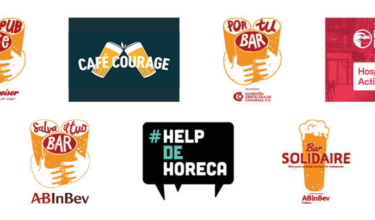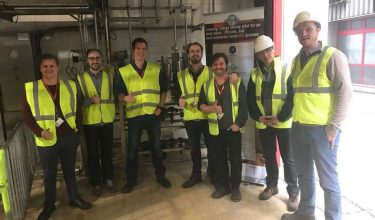Stuart MacFarlane has worked for more than 25 years for the company that is now AB InBev. He started his career at Bass, a small British brewery, which later became part of the then European brewer Interbrew. In 2008, he witnessed the birth of AB InBev; a result of InBev’s combination with the American Anheuser-Busch (known for Budweiser). MacFarlane stepped up as AB InBev’s European Zone President in 2012. Since then, he has experienced first-hand what it means to live the company’s culture, and to leverage it as an enabler for transformation.
“In my career I have experienced eight mergers and acquisitions of other breweries”, says Stuart MacFarlane. “Each was followed by a lot of changes: new beers, better processes, other markets … The common thread throughout all those changes always was our people; they were, and still are, the driving force behind the organization. The media mostly report on our growth, acquisitions and sales. But without our people, we would never have become what we are today: the world’s largest brewer.”
Dream, People and Culture, the great pillars on which AB InBev was built, are unique. “Few other big players are so heavily committed to those pillars,” explains Stuart MacFarlane. “These are not hollow slogans you can find on the walls of our breweries and offices all over the world. No. They are the values that everyone in our company strives for every day.” “Dream: we cherish bigger dreams than any other company in the world. We always aim for the best and when you have tasted the best, you could never settle for mediocrity again. People: with every decision we take as an organization, we first think of our personnel. For example, my job is to form, motivate and train people so they become better than me. And each line manager has that task, even our CEO Carlos Brito. Culture: this is based on our top ten work principles. Ownership is one of the key defining principles. I may be an employee, but that is not the way I see it. This is my company and when I think and act as its owner, I comply with this key principle of my company. Everyone who works here is fully aware of that principle. That is why we do not only consider the skills and talents of the people we are recruiting, we also pay at least as much, if not more attention to their personality: does he or she fit into our culture?”
Meritocracy is also one of AB InBev’s ten principles. Stuart MacFarlane finds it strange that other organizations don’t strongly commit to this. “No one questions the fact that the football player who scores the most goals in a professional club has the highest wages. Just like Hollywood actors and directors who guarantee full houses are also the best paid. Why not apply that same principle to the business world? Whoever delivers top performance and creates the highest added value, must be rewarded. The performance, results and potential of our people determine their reward; because only with the best people can our company perform at its best.”
Today, the success of large international companies and brands is not only measured by the success of their products, the jobs they create or the profits they generate for their shareholders. They are called to demonstrate a broad-based raison d’etre; something that is of high priority to AB InBev, as Stuart MacFarlane explains: “We also want to take the lead in improving the world through corporate social responsibility. Each year we take part in various initiatives that contribute to a better society, such as Global Be(er) Responsible Day and World Environment Day.” On those occasions, employees take to the streets to promote responsible consumption or to organize litter pick-up actions. “By 2025, we want to go a lot further. By then, 20 percent of our global beer volume must consist of noor low-alcohol options in order to support responsible drinking.
Furthermore, by 2025, we have committed to using 100% renewable electricity worldwide.” “Over the next few years, our brands will play an increasingly important role in sustainability. Corona, for instance, works together with the environmental organisation Parley to fight the so-called ‘plastic soup’; plastic pollution in the oceans. By doing so, we, as a large company, give a clear signal and we want to play a pioneering role. After all, people no longer measure the success and importance of a company only by its commercial success. This also applies to our potential employees. If we want to continue to attract the best people, we must be aware of our social responsibility. The world is changing and AB InBev supports that change. Bringing people together for a better world: that’s what drives us as a company,” concludes Stuart MacFarlane.




